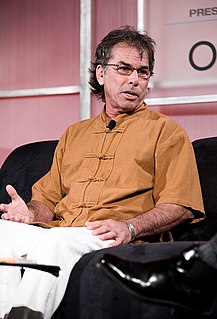A Quote by Kris Kobach
It's not rocket science. It's not super high technology to construct border barriers.
Quote Topics
Related Quotes
As the witness testified before my Subcommittee on Immigration, that barriers magnify the ability of every Border Patrol agent to be more effective. And so if you make up your mind, you can build substantial mileage barriers. It will increase the ability of our officers to perform, and the most important thing is, it sends a message to the world, the border is closed.
We are living in a society that is totally dependent on science and high technology, and yet most of us are effectively alienated and excluded from its workings, from the values of science, the methods of science, and the language of science. A good place to start would be for as many of us as possible to begin to understand the decision-making and the basis for those decisions, and to act independently and not be manipulated into thinking one thing or another, but to learn how to think. That's what science does.
I'm a woman in technology, I think that we have to consider our border and use the technology we have to be sure that we secure it. If you build a six foot wall, somebody may jump eight feet. But, maybe there's surveillance... there's many high tech things that we can use to be sure we are protecting our borders.

































